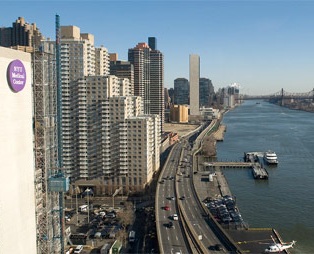 New York University’s Langone Medical Center, overlooking Manhattan’s East River
Hurricane Sandy’s 14-foot storm surge caused massive flooding at New York University’s
Langone Medical Center, a complex of buildings overlooking Manhattan’s East
River. While television footage captured the dramatic evacuation of more than
200 hospital patients, it didn’t convey the disastrous effects of the storm and
ensuing power outages on many of NYU’s prestigious research laboratories. Among them were the labs of veteran AIDS
researchers and former amfAR grantees Dr. Ned Landau and Dr. Derya
Unutmaz.
New York University’s Langone Medical Center, overlooking Manhattan’s East River
Hurricane Sandy’s 14-foot storm surge caused massive flooding at New York University’s
Langone Medical Center, a complex of buildings overlooking Manhattan’s East
River. While television footage captured the dramatic evacuation of more than
200 hospital patients, it didn’t convey the disastrous effects of the storm and
ensuing power outages on many of NYU’s prestigious research laboratories. Among them were the labs of veteran AIDS
researchers and former amfAR grantees Dr. Ned Landau and Dr. Derya
Unutmaz.
“Throughout
this time, everyone who was affected—hundreds of students, postdoctoral scholars, and faculty members—worked
tirelessly, nonstop, in a truly heroic effort to save decades worth of research,”
said Dr. Unutmaz. “We spent all of our waking time from Tuesday through
Saturday night hauling dry ice and liquid nitrogen up ten floors to stock our
freezers and save thousands of our precious frozen cells and other samples. The situation was especially taxing since
diesel fuel in the basement was breached and the building was heavily
contaminated with fumes.”
The Joan
and Joel Smilow Research Center, where his lab is housed, fared the worst of
all buildings on the campus. Dr. Landau,
whose 1996 discovery of the CCR5 HIV co-receptor was a landmark in AIDS
research, is also based in the Smilow building.
“We hope the lab will become
functional soon, as our work requires the technical capabilities of the systems
we have here and is now significantly delayed,” said Dr. Landau.
Despite
the circumstances, the valiant efforts of all those who labored around the
clock during and after the storm were rewarded.
“We managed to save almost all our cells, including those from HIV-positive
donors as well as those from other diseases,” said Dr. Unutmaz. While the lab unfortunately lost all of its
HIV virus stocks as well as precious research mice, Dr. Unutmaz and his
colleagues remain optimistic. “We are not deterred by this tremendous
catastrophe and, in fact, are even more motivated and determined than ever to
quickly rebuild and continue our research.”